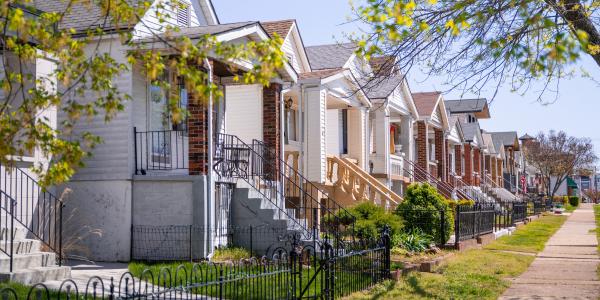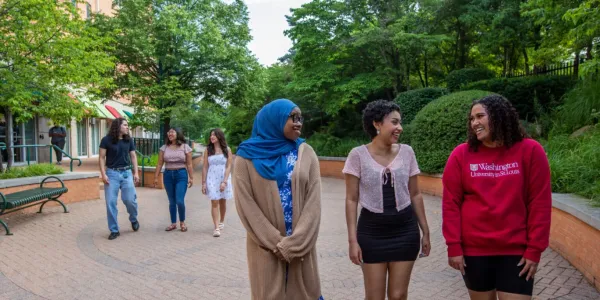The Ampersand program “Examining America” helps first-year students understand the nuanced history of St. Louis and the United States.

Blueberry gelato and a killer veggie sandwich. That’s what I ate for lunch one cool afternoon in March. It was the perfect day to stroll along The Hill, St. Louis’ historic Italian district. A dozen classmates and I chatted as we walked the neighborhood as part of our Ampersand program, “Examining America.” We marveled at the ornate exterior of St. Ambrose Catholic Church. We ogled the narrow shotgun-style houses that stretched out endlessly. That day was one of the highlights of my first year at WashU.
“Examining America” is one of the few courses I’ve come across where you get the opportunity to venture out into the world and really interact with your surroundings. The experience has taught me to find learning in places I never expected. If I had been passing through The Hill on any other day, I never would have stopped to consider, for example, that the religious and cultural homogeneity of the area makes it difficult for new residents to assimilate into the community. Without “Examining America,” I never would have considered the impact of ‘90s punk rock on third-wave feminism, or the reasons why the streets in my hometown are so narrow, or that Shakespeare has been a symbol for popular sovereignty throughout American history and culture. What makes the program so amazing is its ability to make a quest out of learning, enabling students to explore their interests and study them through a critical lens.
The experience has taught me to find learning in places I never expected.
The first-year program takes place over two semesters. Our first semester, we studied the concept of the American dream. We familiarized ourselves with its history, meaning, and how it manifests in American culture, art, and more. Pretty soon, we were well equipped to spot the American dream anywhere and everywhere. In class, we read “The African Company presents Richard III,” a true story about a Black theater group staging Shakespeare’s Richard III. The next week, we went to the Edison and saw it performed. We visited the Kemper Art Museum, where, huddled in a tiny room, we spent an hour analyzing art, searching for messages, and connecting them to ideas of American identity. Now, whenever I’m watching a movie or reading a book, my mind instantly draws a connection. I once thought to myself, “How does ‘Pitch Perfect’ reflect ideas of the American dream?”
At the end of the fall semester, we were tasked with picking any topic and analyzing it from the viewpoint of the American dream. We could make our own art, conduct research, even write poetry. The possibilities were endless. This made me very, very anxious. The training wheels were off! But then I thought about what really interested me at that time: feminist punk rock. I paired up with a friend who was interested in writing about rap and together we recorded a podcast about feminism across modern music. The project helped settle my nerves about doing serious, college-level work. More importantly, it taught me that writing or speaking about something does not have to be a chore. In fact, it’s really fun to talk about the things that interest you, which is something you always get out of “Examining America.”

This spring, we looked at how the American dream manifests across the American landscape. From our nation’s capital to megamalls to Route 66, we ventured into every nook and cranny of America and found something new and peculiar. The most fascinating units to me were on native landscapes and Pruitt-Igoe. It amazes me that there were once thriving cities constructed around gargantuan mounds near modern-day St. Louis. What we take for granted in modern society is, in fact, built right on top of the past. We also learned why the Pruitt-Igoe housing projects in north St. Louis failed in the 1950s and 1960s, and how their demise brought on the decline of the city. With so much of our study focused on St. Louis, “Examining America” is unique to WashU. There are few places where you can find a class with such a comprehensive and analytical study of our very own city.
As my time in the program comes to a close, I am forever grateful that I applied to participate in an Ampersand program. Instead of being plopped into a giant lecture hall, I was placed in a small, intimate class where my voice was always heard. Even though I don’t plan on majoring in American studies or political science, I feel that “Examining America” was a class I needed to take to learn more about myself and my country, and to meet some amazing, unique people.
Conrad Lewis just finished his first year at WashU, where he is majoring in computer science and writing. Conrad keeps himself busy performing in student theatre and writing for Kids on Campus, WashU’s sketch comedy group. He hails from Morristown, New Jersey.





